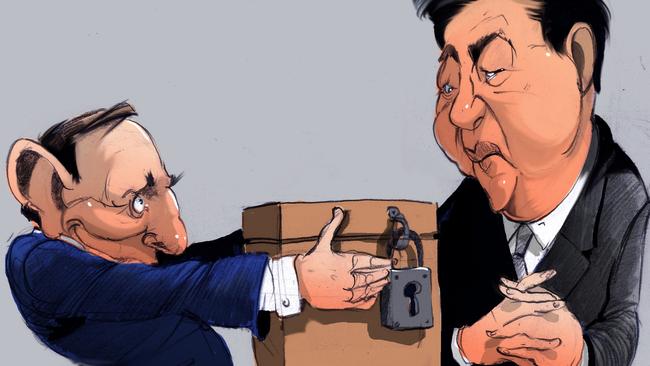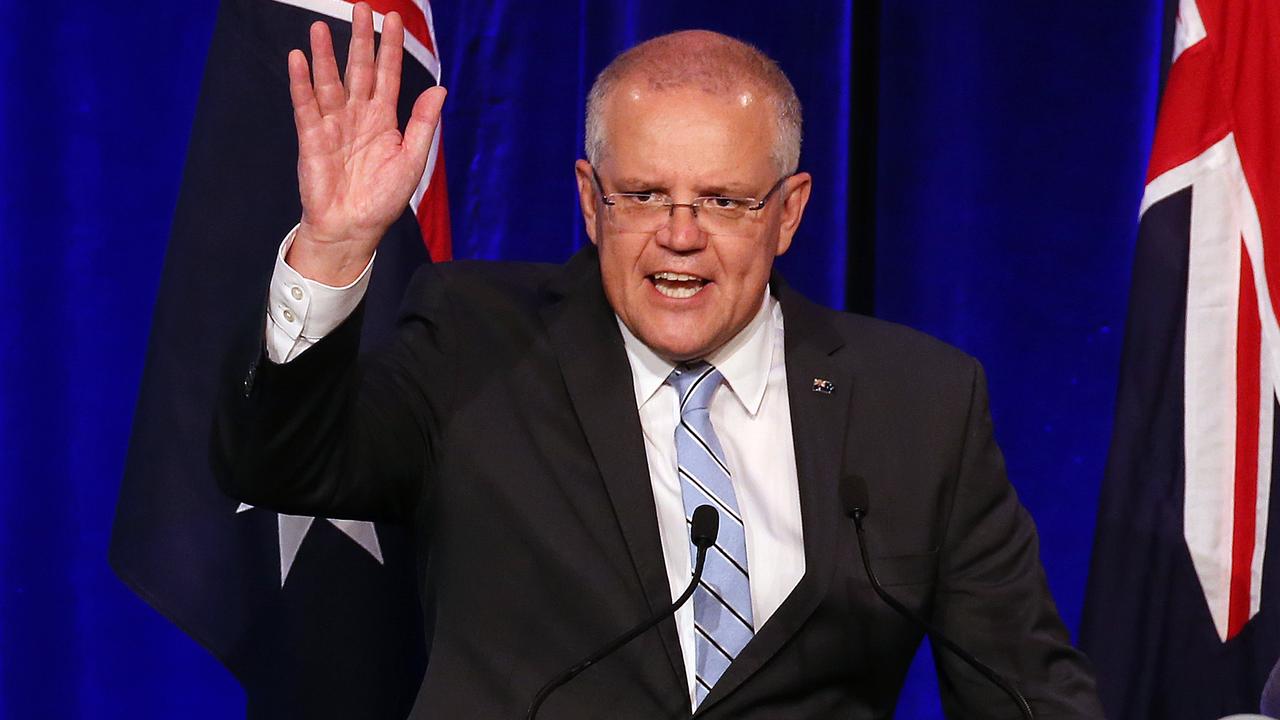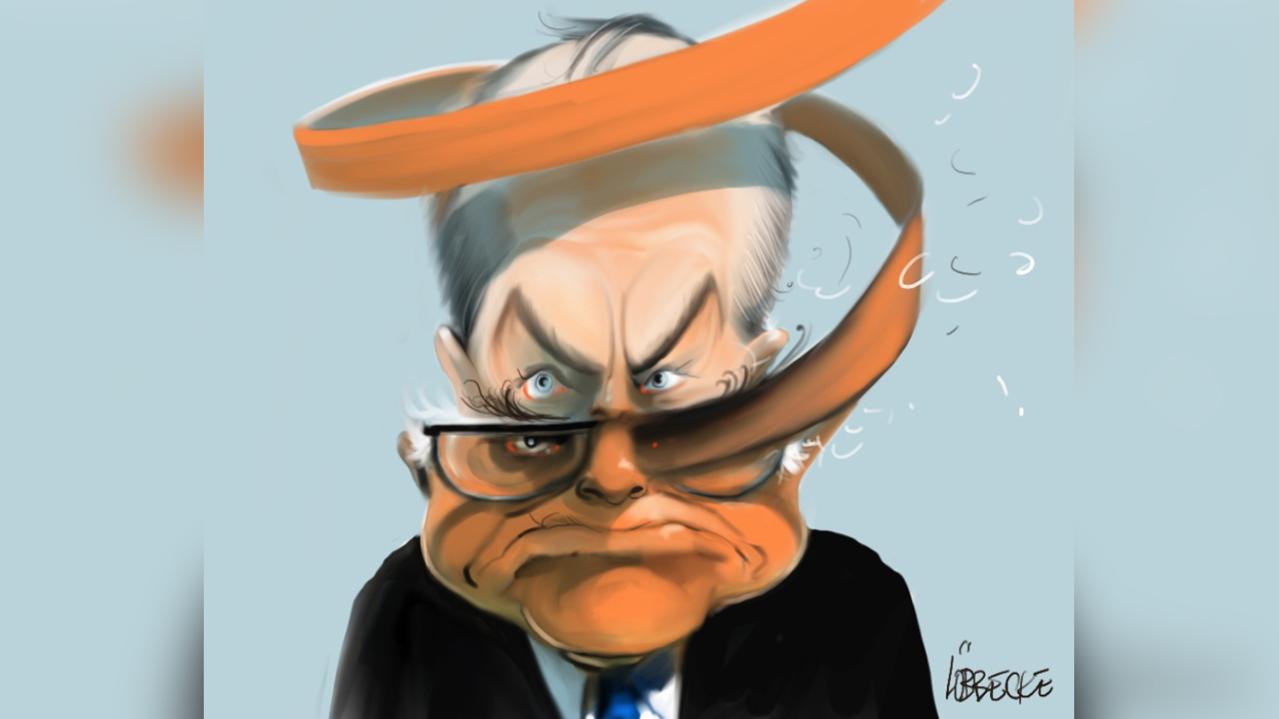Abbott invited ridicule by hailing Xi Jinping’s ‘democracy pledge’

“I HAVE never heard a Chinese leader declare that his country would be fully democratic by 2050,” Tony Abbott proudly told a state dinner on Monday in honour of Chinese President Xi Jinping’s visit. “I thank you, Mr President, for this historic, historic statement which I hope will echo right around the world.”
I literally couldn’t believe my ears when I heard the remarks. Put simply, our Prime Minister completely misunderstood the words of the Chinese leader when he addressed parliament earlier that day. Abbott had spoken well in the chamber, just as he did when the British and Indian prime ministers gave addresses. And the substance of the free trade deal with China was well worthy of applause.
Xi had stated a goal “to turn China into a modern socialist country that is prosperous, democratic, culturally advanced and harmonious by the middle of the century”. That was the only reference to democracy in Xi’s entire speech, which Abbott subsequently clung on to as a “historic, historic statement”.
In the aftermath of Abbott’s analysis of what he had witnessed, China experts the world over lined up to point out that Abbott failed to comprehend the meaning of Xi’s words. For a start, they have been uttered many times before, so there was nothing new in what Abbott tried to draw meaning from. Xi’s words were not a signalling of intent to embrace a “fully democratic” China, as Abbott claimed.
When leaders of China’s ruling Communist Party speak about democracy they (at most) refer to an opening up of the democratic procedures within the one-party model. Any first-year politics course on East and Southeast Asian studies teaches this. At best the Chinese leadership sees a political future for China that morphs into what scholars describe as semi-democracy, along the lines embraced in Singapore. How do we know this? Because President Xi himself has clarified what he means many times before, including in May this year while visiting Europe.
He told students in Belgium that multi-party democracy “did not suit China”. “Constitutional monarchy, imperial restoration, parliamentarism, a multi-party system and a presidential system, we considered them, tried them, but none worked.”
Perhaps Abbott thought Xi had a Damascus-like conversion on the road to the G20 in Brisbane. More likely our Prime Minister was inadequately briefed and lacked the context to understand Xi’s remarks.
“China cannot copy the political system or development model of other countries because it would not fit us and it might even lead to catastrophic consequences”, Xi told audiences in Europe earlier this year. “Some people define reform as changes towards the universal values of the West, the Western political system, or it will not constitute ‘real’ reform. This is a stealthy tampering of the concept and a misunderstanding of our reform,” Xi said. Had diplomacy been put to one side on Monday evening, Xi could have just as easily uttered these words again, this time in response to Abbott’s rhetorical overreach.
On his four-nation tour through Europe, Xi came back to the differences between Western democracy and his vision for China’s future time and time again. In fact, he was saying similar things as far back as November 2012, in a speech dubbed his “Chinese Dream”, two weeks after being elected general secretary of the Communist Party of China’s Central Committee.
More recently Xi has vocally condemned protesters in Hong Kong who are seeking the sort of democracy Abbott attributed to the Chinese President’s remarks in parliament. Just last month Xi pushed back at remarks by Taiwan’s President Ma Ying-jeou that China should embrace democracy.
A simple Google search between the Chinese President’s speech to parliament at 3.30pm and the state dinner that evening would have saved Abbott from embarrassment. His misunderstanding of Xi’s remarks was reported around the world.
What made Abbott think that the leader of the world’s most populous nation, and with that the most powerful authoritarian regime, would use the House of Representatives in Canberra to announce to the world his new-found intention to impose Western-style democracy on his people, backflipping on a lifetime’s commitment to a very different philosophical world view? It is beyond absurd.
Whatever the successes and failures of the past week, Abbott now needs to move on from the enticing role of playing the international statesman.
Right-wing radio host Alan Jones summed up the realpolitik of the domestic environment neatly when he pointed out that voters don’t warm to free trade agreements, notwithstanding the prosperity they offer. Conservative columnist Andrew Bolt used his considerable reach this week to spell out dozens of things the government is doing wrong domestically.
Tuesday’s Newspoll highlighted that voters are deeply unhappy with the Prime Minister and his government. And the split in the Palmer United Party has made dealing with the crossbenchers in the Senate more complicated. Even Abbott couldn’t misinterpret these fruits of the democratic polity to which he had assumed China was edging ever closer.
With his interpretative overreach Abbott highlighted just how limited his knowledge of democratisation in China really is. More worryingly, how on earth could a prime minister make such a blunder, given the access to briefings and information afforded to someone in his position?
There is an irony that Abbott sought to jump on what he thought was a democratic target date of 2050 for China as hugely significant, yet the Coalition quickly dismissed the carbon emissions reduction targets the US and China agreed to at APEC, which included China’s pledge that its emissions would peak by 2030.
Abbott’s blunder over China was driven by hubris, a trap leaders often fall into when strutting the world stage (remember Kevin Rudd’s grander-than-grand aspirations at Copenhagen?).
It was a shame Abbott misspoke, given the obvious credit the Coalition deserves for inking the free trade deal with China.
Had the Prime Minister taken a look at Sun Tzu’s The Art of War before Monday’s state dinner, chapter three would have made for useful reading: “If you know the enemy and know yourself, you need not fear the result of a hundred battles. If you know yourself but not the enemy, for every victory gained you will also suffer a defeat. If you know neither the enemy nor yourself, you will succumb in every battle.”
Confucius put it more succinctly (note that the authorship of this quote is contested): “It is better to keep one’s mouth shut and be thought a fool than to open it and remove all doubt.”
Peter van Onselen is a professor at the University of Western Australia.



To join the conversation, please log in. Don't have an account? Register
Join the conversation, you are commenting as Logout